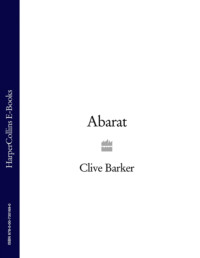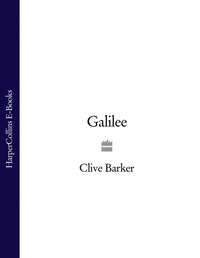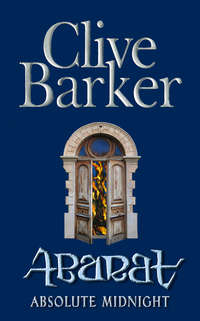
Полная версия
Coldheart Canyon

Clive Barker
__________________________
COLDHEART CANYON


This novel is entirely a work of fiction. The names, characters and incidents portrayed in it are the work of the author's imagination. Any resemblance to actual persons, living or dead, events or localities is entirely coincidental.
HarperVoyager An imprint of HarperCollinsPublishers Ltd. 1 London Bridge Street London SE1 9GF
www.harpercollins.co.uk
First published in Great Britain by HarperCollinsPublishers 2001
Copyright © Clive Barker 2001
Clive Barker asserts the moral right to be identified as the author of this work
A catalogue record for this book is available from the British Library
All rights reserved under International and Pan-American Copyright Conventions. By payment of the required fees, you have been granted the non-exclusive, non-transferable right to access and read the text of this ebook on-screen. No part of this text may be reproduced, transmitted, down-loaded, decompiled, reverse engineered, or stored in or introduced into any information storage and retrieval system, in any form or by any means, whether electronic or mechanical, now known or hereinafter invented, without the express written permission of HarperCollins ebooks
HarperCollinsPublishers has made every reasonable effort to ensure that any picture content and written content in this ebook has been included or removed in accordance with the contractual and technological constraints in operation at the time of publication
Source ISBN: 9780006510406
Ebook Edition © SEPTEMBER 2008 ISBN: 9780007301966
Version: 2017-06-02
Dedication
For David Emilian Armstrong
PROLOGUE
_______________
THE CANYON
It is night in Coldheart Canyon, and the wind comes off the desert. The Santa Anas, they call these winds. They blow off the Mojave, bringing malaise, and the threat of fire. Some say they are named after Saint Anne, the mother of Mary, others that they are named after one General Santa Ana, of the Mexican cavalry, a great creator of dusts; others still that the name is derived from santanta, which means Devil Wind.
Whatever the truth of the matter, this much is certain: the Santa Anas are always baking hot, and often so heavily laden with perfume that it’s as though they’ve picked up the scent of every blossom they’ve shaken on their way here. Every wild lilac and wild rose, every white sage and rank jimsonweed, every heliotrope and creosote bush: gathered them all up in their hot embrace and borne them into the hidden channel of Coldheart Canyon.
There’s no lack of blossoms here, of course. Indeed, the Canyon is almost uncannily verdant. Some of the plants here were brought in from the world outside by these same burning winds, these Santa Anas; others were dropped in the faeces of the wild animals who wander through – the deer and coyote and racoon; some spread from the gardens of the great dream palace that lays solitary claim to this corner of Hollywood. Alien blooms, this last kind – orchids and lotus flowers–nurtured by gardeners who have long since left off their pruning and their watering, and departed, allowing the bowers which they once treasured to run riot.
But for some reason there is always a certain bitterness in the blooms here. Even the hungry deer, driven from their traditional trails these days by the presence of sightseers who have come to see Tinseltown, do not linger in the Canyon for very long. Though the deer venture along the ridge and down the steep slopes of the Canyon, and curiosity, especially amongst the younger animals, often leads them over the rotted fences and toppled walls into the secret enclaves of the gardens, they seldom choose to stay there for very long.
Perhaps it isn’t just that the leaves and petals are bitter. Perhaps there are too many whisperings in the air around the ruined gazebos, and the animals are unnerved by what they hear. Perhaps there are too many presences brushing against their trembling flanks as they explore the clotted pathways. Perhaps, as they graze the overgrown lawns, they look up and mistake a statue for a pale fragment of life, and are startled by their error, and take flight.
Perhaps, sometimes, they are not mistaken.
Perhaps.
The Canyon is familiar with perhaps; with what may or may not be. And never more so than on such a night as this, when the winds come sighing off the desert, heavy with their perfume, and such souls as the Canyon hosts express their longing for something they dreamed they had, or dreamed that they dreamed, their voices so tenuous tonight that they’re inaudible to the human ear, even if there were someone to hear them, which there never is.
That’s not entirely true. On occasion somebody will be tenacious enough to find their way into this vale of luxury and tears; a tourist, perhaps even a family of tourists, foolishly determined to discover what lies off the prescribed route; looking for some famous heart-throb’s love-nest, or a glimpse of the idol himself, caught unawares as he walks with his dog. There are even a few trespassers over the years who have found their way here intentionally, guided to this place by hints dropped in obscure accounts of Old Hollywood. They venture cautiously, these few. Indeed there is often something close to reverence in the way they enter Coldheart Canyon. But however these visitors arrive, they always leave the same way: hurriedly, with many a nervous backward glance. Even the crassest of them – even the ones who’d claim they don’t have a psychic bone in their bodies – are discomfited by something they sniff here. Their sixth sense, they have discovered, is far more acute than they had thought. Only when they have outrun the all-too-eager shadows of the Canyon and they are back in the glare of the billboards on Sunset Boulevard, do they wipe their clammy palms, and wonder to themselves how it was that in such a harmless spot they could have been so very afraid.
Contents
Cover
Title Page
Copyright
Dedication
Prologue
Part One
Part Two
Part Three
Part Four
Part Five
Part Six
Part Seven
Part Eight
Part Nine
Part Ten
Part Eleven
Keep Reading
About the Author
Epilogue
Acknowledgments
Other Books
About the Publisher
PART ONE
_________________
THE PRICE OF
THE HUNT
Chapter 1
‘Your wife did not want to look around the Fortress any further, Mr Zeffer?’ Father Sandru said, seeing that on the second day the middle-aged man with the handsome, sad face had come alone.
‘The lady is not my wife,’ Zeffer explained.
‘Ah …’ the monk replied, the tone of commiseration in his voice indicating that he was far from indifferent to Katya’s charms ‘A pity for you, yes?’
‘Yes,’ Zeffer admitted, with some discomfort.
‘She’s a very beautiful woman.’
The monk studied Zeffer’s face as he spoke, but having said what he’d said, Zeffer was unwilling to play the confessee any further.
‘I’m her manager,’ he explained. ‘That’s all there is between us.’
Father Sandru, however, was not willing to let the issue go just yet. ‘After the two of you departed yesterday,’ he said, his English coloured by his native Romanian, ‘one of the brothers remarked that she was the most lovely woman he had ever seen …’ he hesitated before committing to the rest of the sentence ‘… in the flesh.’
‘Her name’s Katya, by the way,’ Zeffer said.
‘Yes, yes, I know,’ said the Father, his fingers combing the knotted grey-white of his beard as he stood assessing Zeffer.
The two men were a study in contrasts. Sandru ruddy-faced and rotund in his dusty brown habit, Zeffer slimly elegant in his pale linen suit.
‘She is a movie star, yes?’
‘You saw one of her films?’
Sandru grimaced, displaying a poorly-kept array of teeth. ‘No, no,’ he said. ‘I do not see these things. At least not often. But there is a little cinema in Ravbac, and some of the younger brothers go down there quite regularly. They are great fans of Chaplin, of course. And there’s a … vamp … is that the word?’
‘Yes,’ Zeffer replied, somewhat amused by this conversation. ‘Vamp’s the word.’
‘Called Theda Bara.’
‘Oh, yes. We know Theda.’
In that year – which was 1920 – everybody knew Theda Bara. She had one of the most famous faces in the world. As, of course, did Katya. Both were famous; their fame tinged with a delicious hint of decadence.
‘I must go with one of the brothers when they next go to see her,’ Father Sandru said.
‘I wonder if you entirely understand what kind of woman Theda Bara portrays?’ Zeffer replied.
Sandru raised a thicketed eyebrow. ‘I am not born yesterday, Mr Zeffer. The Bible has its share of these women, these vamps. They’re whores, yes; women of Babylon? Men are drawn to them only to be destroyed by them?’
Zeffer laughed at the directness of Sandru’s description. ‘I suppose that’s about right,’ he said.
‘And in real life?’ Sandru said.
‘In real life Theda Bara’s name is Theodosia Goodman. She was born in Ohio.’
‘But is she a destroyer of men?’
‘In real life? No, I doubt it. I’m sure she harms a few egos now and again, but that’s about the worst of it.’
Father Sandru looked mildly disappointed. ‘I shall tell the brothers what you told me,’ he said. ‘They’ll be very interested. Well then … shall I take you inside?’
Willem Matthias Zeffer was a cultured man. He had lived in Paris, Rome, London and briefly in Cairo in his forty-three years; and had promised himself that he would leave Los Angeles – where there was neither art nor the ambition to make art – as soon as the public tired of lionizing Katya, and she tired of rejecting his offer of marriage. They would wed, and come back to Europe; find a house with some real history on its bones, instead of the fake Spanish mansion her fortune had allowed her to have built in one of the Hollywood canyons.
Until then, he would have to find aesthetic comfort in the objets d’art he purchased on their trips abroad: the furniture, the tapestries, the statuary. They would suffice, until they could find a château in the Loire, or perhaps a Georgian house in London; somewhere the cheap theatrics of Hollywood wouldn’t curdle his blood.
‘You like Romania?’ the Father asked as he unlocked the great oak door that lay at the bottom of the stairs.
‘Yes, of course,’ Zeffer replied.
‘Please do not feel you have to sin on my account,’ Sandru said, with a sideways glance.
‘Sin?’
‘Lying is a sin, Mr Zeffer. Perhaps it’s just a little one, but it’s a sin nevertheless.’
Oh Lord, Zeffer thought; how far I’ve slipped from the simple proprieties! Back in Los Angeles he sinned as a matter of course; every day, every hour. The life he and Katya lived was built on a thousand stupid little lies.
But he wasn’t in Hollywood now. So why lie? ‘You’re right. I don’t like this country very much at all. I’m here because Katya wanted to come. Her mother and father – I’m sorry, her stepfather – live in the village.’
‘Yes. This I know. The mother is not a good woman.’
‘You’re her priest?’
‘No. We brothers do not minister to the people. The Order of St Teodor exists only to keep its eyes on the Fortress.’ He pushed the door open. A dank smell exuded from the darkness ahead of them.
‘Excuse me for asking,’ Zeffer said. ‘But it was my understanding from yesterday that apart from you and your brothers, there’s nobody here.’
‘Yes, this is true. Nobody here, except the brothers.’
‘So what are you keeping your eyes on?’
Sandru smiled thinly. ‘I will show you,’ he said. ‘As much as you wish to see.’
He switched on a light, which illuminated ten yards of corridor. A large tapestry hung along the wall, the image upon it so grey with age and dust as to be virtually beyond interpretation.
The Father proceeded down the corridor, turning on another light as he did so. ‘I was hoping I might be able to persuade you to make a purchase,’ he said.
‘Of what?’ Zeffer said.
Zeffer wasn’t encouraged by what he’d seen so far. A few of the pieces of furniture he’d spotted yesterday had a measure of rustic charm, but nothing he could imagine buying.
‘I didn’t realize you were selling the contents of the Fortress.’
Sandru made a little groan. ‘Ah … I’m afraid to say we must sell in order to eat. And that being the case, I would prefer that the finer things went to someone who will take care of them, such as yourself.’
Sandru walked on ahead a little way, turning on a third light and then a fourth. This level of the Fortress, Zeffer was beginning to think, was bigger than the floor above. Corridors ran off in all directions.
‘But before I begin to show you,’ Sandru said, ‘you must tell me – are you in a buying mood?’
Zeffer smiled. ‘Father, I’m an American. I’m always in a buying mood.’
Sandru had given Katya and Zeffer a history of the Fortress the previous day; though as Zeffer remembered it there was much in the account that had sounded bogus. The Order of St Teodor, Zeffer had decided, had something to hide. Sandru had talked about the Fortress as a place steeped in secrets; but nothing particularly bloody. There had been no battles fought there, he claimed, nor had its keep ever held prisoners, nor its courtyard witnessed atrocity or execution. Katya, in her usual forthright manner, had said that she didn’t believe this to be true.
‘When I was a little girl there were all kinds of stories about this place,’ she said. ‘I heard horrible things were done here. That it was human blood in the mortar between the stones. The blood of children.’
‘I’m sure you must have been mistaken,’ the Father had said.
‘Absolutely not. The Devil’s wife lived in this fortress. Lilith, they called her. And she sent the Duke away on a hunt. And he never came back.’
Sandru laughed; and if it was a performance, then it was an exceptionally good one. ‘Who told you these tales?’ he said.
‘My mother.’
‘Ah,’ Sandru had shaken his head. ‘And I’m sure she wanted you in bed, hushed and asleep, before the Devil’s wife came to cut off your head.’ Katya had made no reply to this. ‘There are still such stories, told to children. Of course. Always stories. People invent tales. But believe me, this is not an unholy place. The brothers would not be here if it was.’
Despite Sandru’s plausibility, there’d still been something about all of this that had made Zeffer suspicious; and a little curious. Hence his return visit. If what the Father was saying was a lie (a sin, by his own definition), then what purpose was it serving? What was the man protecting? Certainly not a few rooms filled with filthy tapestries, or some crudely carved furniture. Was there something here in the Fortress that deserved a closer look? And if so, how did he get the Father to admit to it?
The best route, he’d already decided, was fiscal. If Sandru was to be persuaded to reveal his true treasures, it would be through the scent of hard cash in his nostrils. The fact that Sandru had raised the subject of buying and selling made the matter easier to broach.
‘I do know Katya would love to have something from her homeland to take back to Hollywood,’ he said. ‘She’s built a huge house, so we have plenty of room.’
‘Oh, yes?’
‘And of course, she has the money.’
This was naked, he knew, but in his experience of such things subtlety seldom played well. Which point was instantly proved.
‘How much are we talking about?’ the Father asked mildly.
‘Katya Lupi is one of the best-paid actresses in Hollywood. And I am authorized to buy whatever I think might please her.’
‘Then let me ask you: what pleases her?’
‘Things that nobody else would be likely – no, could possibly – possess, please her,’ Zeffer replied. ‘She likes to show off her collection, and she wants everything in it to be unique.’
Sandru spread his arms and his smile. ‘Everything here is unique.’
‘Father, you sound as though you’re ready to sell the foundations if the price is right.’
Sandru waxed metaphysical. ‘All these things are just objects in the end. Yes? Just stone and wood and thread and paint. Other things will be made in time, to replace them.’
‘But surely there’s some sacred value in the objects here?’
The Father gave a little shrug. ‘In the Chapel, upstairs, yes. I would not want to sell you, let us say, the altar.’ He made a smile, as though to say that under the right circumstances even that would have its price. ‘But everything else in the Fortress was made for a secular purpose. For the pleasure of dukes and their ladies. And as nobody sees it now … except a few travellers such as yourselves, passing through … I don’t see why the Order shouldn’t be rid of it all. If there’s sufficient profit to be made it can be distributed amongst the poor.’
‘There are certainly plenty of people in need of help,’ Zeffer said.
He had been appalled at the primitive conditions in which many of the people in the locality lived. The villages were little more than gatherings of shacks, the rocky earth the farmers tilled all but fruitless. And on all sides, the mountains – the Bucegi range to the east, to the west the Făgăras Mountains – their bare lower slopes as grey as the earth, their heights dusted with snow. God knew what the winters were like in this place: when even the earth turned hard as stone, and the little river froze, and the walls of the shacks could not keep out the wind whistling down from the mountain heights.
The day they’d arrived, Katya had taken Willem to the cemetery, so that she could show him where her grandparents were buried. There he’d had proof aplenty of the conditions in which her relatives lived and died. It was not the resting places of the old that had moved Willem; it was the endless rows of tiny crosses that marked the graves of infants: babies lost to pneumonia, malnutrition and simple frailty. The grief that was represented by these hundreds of graves had moved him deeply: the pain of mothers, the unshed tears of fathers and grandfathers. It was nothing he had remotely expected, and it had made him sick with sorrow.
For her part, Katya had seemed untouched by the sight, talking only of her memories of her grandparents and their eccentricities. But then this was the world in which she’d been raised; it wasn’t so surprising, perhaps, that she took all this suffering for granted. Hadn’t she once told him she’d had fourteen brothers and sisters, and only six of them were left living? Perhaps the other eight had been laid to rest in the very cemetery where they’d walked together. And certainly it would not be uncommon for Katya to look coldly on the business of the heart. It was what made her so strong; and it was her strength – visible in her eyes and in her every movement – that endeared her to her audiences, particularly the women.
Zeffer understood that coldness better now that he’d spent time here with her. Seeing the house where she’d been born and brought up, the streets she’d trudged as a child; meeting the mother who must have viewed her appearance in their midst as something close to a miracle: this perfect rose-bud child whose dark eyes and bright smile set her utterly apart from any other child in the village. In fact, Katya’s mother had put such beauty to profitful work at the age of twelve, when the girl had been taken from town to town to dance in the streets, and – at least according to Katya – offer her favours to men who’d pay to have such tender flesh in their bed for the night. She had quickly fled such servitude, only to find that what she’d had to do for her family’s sake she had no choice but to do for herself. By the age of fifteen (when Zeffer had met her, singing for her supper on the streets of Bucharest) Katya had been a woman in all but years, her flowering an astonishment to all who witnessed it. For three nights he’d come to the square where she sang, there to join the group of admirers who were gathered around to watch this child-enchantress. It hadn’t taken him long to conceive of the notion that he should bring her back with him to America. Though he’d had at that time no experience in the world of the cinema (few people did; the year was 1916, and film was a fledgling), his instincts told him there was something special in the face and bearing of this creature. He had influential friends on the West Coast – mostly men who’d grown tired of Broadway’s petty disloyalties and piddling profits, and were looking for a new place to put their talents and their investments – who reported to him that cinema was a grand new frontier, and that talent scouts on the West Coast were looking for faces that the camera, and the public, would love. Did this child-woman not have such a face, he’d thought? Would the camera not grow stupid with infatuation to look into those guileful yet lovely eyes? And if the camera fell, could the public be far behind?
He’d inquired as to the girl’s name. She was one Katya Lupescu from the village of Ravbac. He approached her; spoke to her; told her, over a meal of cabbage-rolls and cheese, what he was thinking. She was curiously sanguine about his whole proposal; practically indifferent. Yes, she conceded, it sounded interesting, but she wasn’t sure if she would ever want to leave Romania. If she went too far from home, she would miss her family.
A year or two later, when her career had begun to take off in America – she no longer Katya Lupescu by then but Katya Lupi, and Willem her manager – they’d revisited this very conversation, and Zeffer had reminded her how uninterested she’d seemed in his grand plan. Her coolness had all been an illusion, she’d confessed; a way in part to keep herself from seeming too gauche in his eyes, and in part a way to prevent her hopes getting too high.
But that was only part of the answer. There was also a sense in which the indifference she’d demonstrated that first day they’d met (and – more recently – in the cemetery) was a real part of her nature; bred into her, perhaps, by a bloodline that had suffered so much loss and anguish over the generations that nothing was allowed to impress itself too severely: neither great happiness nor great sadness. She was, by her own design, a creature who held her extremes in reserve, providing glimpses only for public consumption. It was these glimpses that the audience in the square had come to witness night after night. And it was this same power she would unleash when she appeared before the cinematographic camera.
Interestingly, Katya had shown none of this quality to Father Sandru the previous day.
In fact, it was almost as though she’d been playing a part: the role of a rather bland God-fearing girl in the presence of a beloved priest. Her gaze had been respectfully downcast much of the time, her voice softer than usual, her vocabulary – which often tended to the salty – sweet and compliant.








